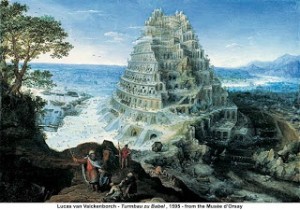– James Gleick, The Information: A History, A Theory, A Flood
“Throw it against the kabbalah and see if it sticks.” That’s the semi-joking line I often use to belittle Crowley influenced magicians, particularly Thelemites. It sums up their obsession with correspondences. Their desperate drive to shoe-horn everything into the tree of life. It also makes me an asshole, and in some respects, a little jealous. A unifying theory does have its advantages.
I’m a self professed chaote(1). When I first discovered chaos magick, what appealed was not the worship of the random, the punk attitude(2), or the manta, “Nothing is true. Everything is permitted.” That’s just another way of saying, “Do as thou Wilt.” What captivated me was the possibility. Chaos magick gave us permission to create our own gods out of all this modern wreckage we call a culture. If Homer Simpson became chief of the pantheon so be it, it was my pantheon.
I’ve never been a follower. In fact, I’m often embarrassed by my own lack of credentials. I’ve never been a member of the OTO, AA, Golden Dawn, IOT, or AMORC. I’ve never been a mason. Upon discovering my college pagan club, I attended a group ritual exactly once. The best I can muster now is a lively discussion group. I just can’t dedicate myself to something I have so little control of. No matter how much I miss out on resources or the experience of initiation. I’m not against group experience. In fact, I long for it, and I am on the lookout for the right people to form a new order, one we could call our own.
I choose. That could be called the rallying cry of the information era. With the ability given to us by the internet to learn about everything, and to connect to the likeminded, we choose, now more than ever, for good or for ill, what we want to experience. Chaotes pretend that they invented mashing together magical systems. That’s ridiculous of course. MacGregor Mathers’ resounding success as a magus stemmed from his mixing of Eastern and Western traditions(3). Crowley only followed in his footsteps. But Mathers was limited at the time by what he could discover in the library at the British Museum. Our choices are limitless. We can summon medieval goetic demons using Santeria rituals. We can make saints of Pink Floyd, and ritualize Dark Side of the Moon.
So the question becomes, what to choose? Are all magical tools created equally? How does one compare the power of symbols? Is Mickey Mouse as powerful as or more powerful than Neptune? And who is Neptune but King Triton from The Little Mermaid? The answer seems obvious, which one works best for you? But how do we judge? How do we parse the relevance and usefulness of magical symbols?
In the beginning, the internet appealed only to the dedicated. Only those wishing to set sail on endless seas, get lost in the torrent of information, dared to navigate its depths. Web browsing changed from hobby to the most prevalent way to disseminate information not by virtue of how much it had, but on how well we could find it. First we had Alta Vista, then Yahoo, and now, love it or hate it, Google reigns over a Pax Cyberia. But can there ever be a way to wade through the sea of magical tools and bring back only what is most useful for us? That’s the question I believe needs to be answered for magick to take its next leap forward.
(1) Yes, I think anything that comes out of Peter J. Carroll’s ass is a divine wind.
(2) Okay, maybe just a little.
(3) Maybe not invent, but at least popularize.
